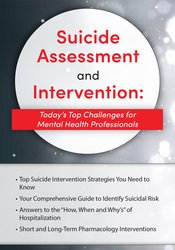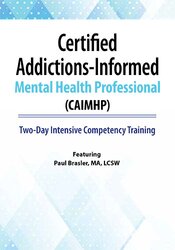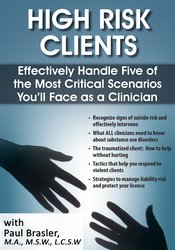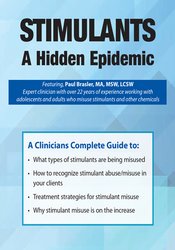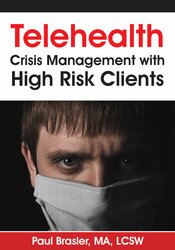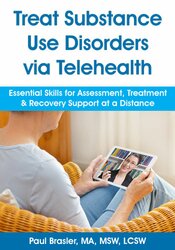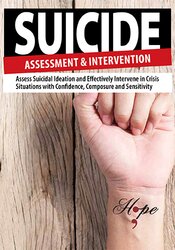What You’ll Discover in Paul Brasler Suicide Assessment and Intervention Today’s Top Challenges for Mental Health Professionals
- Faculty:
- Paul Brasler
- Duration:
- 2 Hours 44 Minutes
- Format:
- Audio and Video
- Copyright:
- Sep 27, 2019
Description
What would you do?
“I woke up this morning and decided I didn’t have anything to live for. I told my dad that he would find me dead when he came home,” said Michelle, a 13-year-old girl sitting in a hospital bed. Her father reacted to his daughter’s declaration by bringing her to the hospital. Michelle was referred to me for assessment.
After some introductions and an explanation as to why I was there, Michelle agreed to speak with me by herself.
“So, was today the first time you’d had thoughts of killing yourself?” I asked.
“Yes,” she replied, “I woke up tired of feeling this way, you know, depressed.”
“Have you thought about how you might try to kill yourself?”
“Not really; I figured I’d look around the house to see what I could use,” she stated.
What would you do next? Is this a person who needs to be hospitalized? How would you handle this situation differently if you were seeing Michelle in your office instead of a hospital?
Suicidal behaviors and suicidal ideation represent some of the most challenging things we deal with as clinicians.
Watch this recording to learn how to help your most vulnerable clients with the real-life skills and knowledge they don’t teach in graduate school.
Handouts
| Manual – Suicide Assessment and Intervention (4.1 MB) | 70 Pages | Available after Purchase |
Outline
Assessment: Your Comprehensive Guide to Identify Suicidal Risk
- Suicide, ideation, plan, means and intent
- Why do people kill themselves?
- Risk and protective factors
- How to identify implicit suicidal intent
- Strategies for asking direct questions (even when it’s uncomfortable)
- How to engage shut down, withdrawn or resistant clients
Suicide Intervention Strategies: Supporting Clients From “Passive” Ideation to Full-Blown Crisis
- Psychological interventions
- Problem solving
- Emotional regulation
- Communication
- Pharmacology: Short and long term interventions
- Why “no harm” contracts are a dangerous idea (and what to do instead)
- When to break client confidentiality
- How and when to involve loved ones/caregivers
- Hospitalization: Why, when, how
- Clinicians inside the ER: When to admit/planning for home
- After the ER: Limiting the risk
- Documentation: Protect your client, protect your license
Other Clinical Considerations
- Non-suicidal self-injury (NSSI)
- Relationship between suicide, mental illness and trauma
- Tips for managing clinician anxiety around suicidality
Faculty
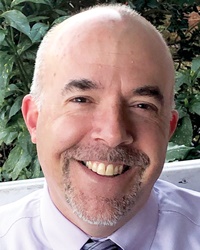
Paul Brasler, MA, LCSW Related seminars and products: 10
Paul Brasler, MA, LCSW, has worked in the social work field for the past 22 years. He is the head of behavioral health for Daily Planet Health Services, a Federally Qualified Health Center that provides comprehensive and integrated healthcare and mental health services (including medication-assisted opioid treatment). Paul is also president of Providence Consulting & Education L.L.C., through which he provides clinical supervision and professional education services.
Paul has extensive experience in working with people with substance use disorders. After finishing school, Paul went to work at an adolescent residential treatment program, where he developed a treatment track for adolescents with substance use disorders. In 2003, he became a senior clinician in the Chesterfield County Juvenile Drug Court and provided individual, family, adolescent group and multifamily group therapies. After working at the drug court for seven years, Paul moved on to conduct psychiatric and substance misuse evaluations in emergency departments in the Greater Richmond, Virginia area. Paul has also served as adjunct faculty in the school of social work at Virginia Commonwealth University, where he developed a graduate course in substance abuse treatment.
Paul has been a PESI presenter since 2016, and he has presented classes on mental health emergencies and high-risk clients across the country. He recently released his first book, High-Risk Clients: Evidence-Based Assessment & Clinical Tools to Recognize and Effectively Respond to Mental Health Crises (PESI Publishing 2019).
Speaker Disclosures:
Financial: Paul Brasler is in private practice. He receives a speaking honorarium from PESI, Inc.
Non-financial: Paul Brasler has no relevant non-financial relationship to disclose.
| Online Viewing or Digital Download | Paul Brasler – Suicide Assessment and Intervention – Today’s Top Challenges for Mental Health Professionals
IMPORTANT: This entire “Paul Brasler – Suicide Assessment and Intervention – Today’s Top Challenges for Mental Health Professionals” is completely downloadable and available in your account
(In case of a broken link, we will renew your link shortly).
We appreciate your patience.

